Results
-
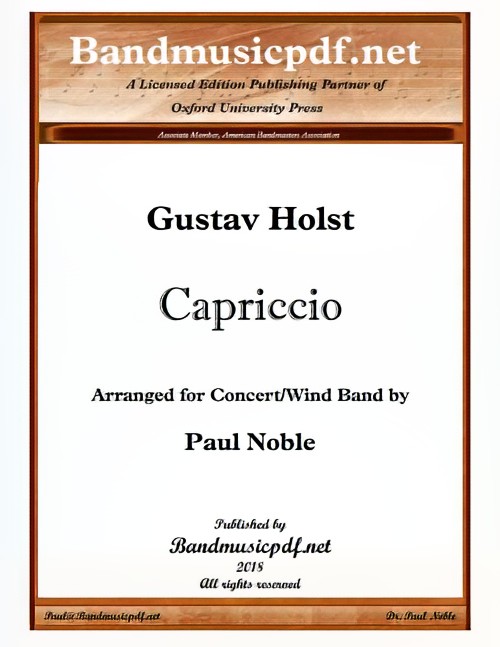 £140.00
£140.00Capriccio (Concert Band - Score and Parts) - Holst, Gustav - Noble, Paul
The following notes have been excerpted by the arranger from those presented in the Introduction by Imogen Holst, daughter of Gustav Holst: Holst wrote this work in the spring of 1932, while he was guest Lecturer in Composition at Harvard University. He had been asked by Nathaniel Shilkret to write 'a short radio piece, not longer than five or six minutes.' for a composers' series on folk music themes. Holst wrote to me on 13 May 1932, saying: 'On May 1 I started sketching a piece for Shilkret's Radio jazz band in New York. I finished the sketch on the 4th and the full score on the 8th... Shilkret wanted something on American airs but I've left them out because I prefer my own so he may reject the thing.' Shilkret was enthusiastic about the piece, but he was unable to use it for his series. 'I hate to give it up,' he told the composer, 'but I cannot play it because it is not based on a definite English or American folk theme.' Holst never revised his hurriedly-written work, probably because he had too many other things to write during the remaining two years of his life, when he was having to spend a good deal of his time in hospital. The autograph manuscript of his original full score is in the British Library, MS Add.47833. The work had no name: Holst referred to it either as his 'Jazz band piece' or as 'Mr. Shilkret's Maggot.' The score needed editing. There were gaps and patches, with incomplete dynamics and phrase marks. I made the version for orchestra and named it 'Capriccio' in spite of the viola's (now saxophone's) expressive opening, because from the moment of the marimba's first animated remark there can be no doubt about the mood of the music. - Imogen Holst (1968)
Estimated dispatch 7-14 working days
-
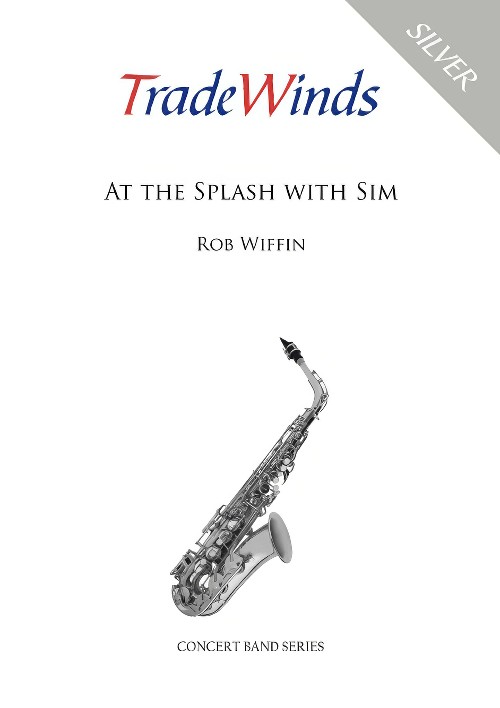 £34.95
£34.95At the Splash with Sim (Concert Band - Score and Parts) - Wiffin, Rob
About 10 minutes walk from where the composer lives, there is a ford in a river. It is called The Splash and is one of his dog, Simba's, favourite places. No day is complete for him without a swim in the Splash, no matter what the weather is like. It is a lovely spot where the water swirls gently although on occasions when the river is in full spate it can rise quickly and become forceful. This piece reflects that, with its fluid motif running throughout. There is some decorative writing for the woodwind but the pace of the music is moderate and the technical demands are therefore easily manageable.
Estimated dispatch 7-14 working days
-
 £6.95
£6.95At the Splash with Sim (Concert Band - Score Only) - Wiffin, Rob
About 10 minutes walk from where the composer lives, there is a ford in a river. It is called The Splash and is one of his dog, Simba's, favourite places. No day is complete for him without a swim in the Splash, no matter what the weather is like. It is a lovely spot where the water swirls gently although on occasions when the river is in full spate it can rise quickly and become forceful. This piece reflects that, with its fluid motif running throughout. There is some decorative writing for the woodwind but the pace of the music is moderate and the technical demands are therefore easily manageable.
Estimated dispatch 7-14 working days
-
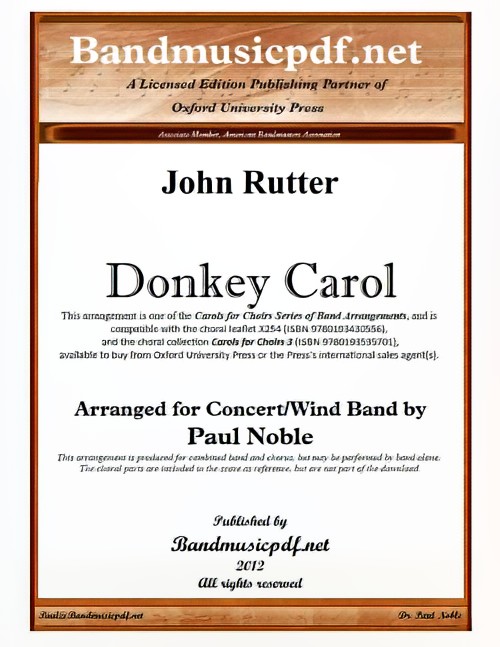 £75.00
£75.00Donkey Carol (Concert Band with Optional Choir - Score and Parts) - Rutter, John - Noble, Paul
This scintillating carol in 5/8 meter will offer a pleasant rhythmic challenge to your ensemble, and the results will delight both ensemble and audience. This arrangement is written and intended for combined Wind Band and Chorus. However, it is also arranged so that it is complete with Wind Band alone. The choral part is shown in the conductor's score, but is not a part of the instrumental packet. The arrangement is compatible with the published vocal score. The scoring is done with some cue size notations that should be played if performing without the chorus. This will make a delightful addition to any Christmas or seasonal concert.
Estimated dispatch 7-14 working days
-
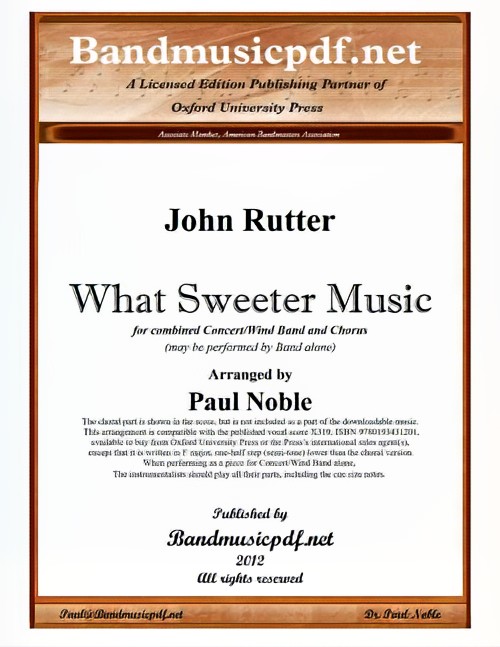 £75.00
£75.00What Sweeter Music (Concert Band with Optional Choir - Score and Parts) - Rutter, John - Noble, Paul
Perhaps John Rutter's most famous and popular carol is What Sweeter Music. This arrangement is written and intended for combined Wind Band and Chorus. However, it is also arranged so that it is complete with Wind Band alone. The choral part is shown in the conductor's score, but is not a part of the set. This arrangement is compatible with the published vocal score. The scoring is done with some cue size notations that should be played if performing without the chorus. This will make a delightful addition to any Christmas or seasonal concert.
Estimated dispatch 7-14 working days
-
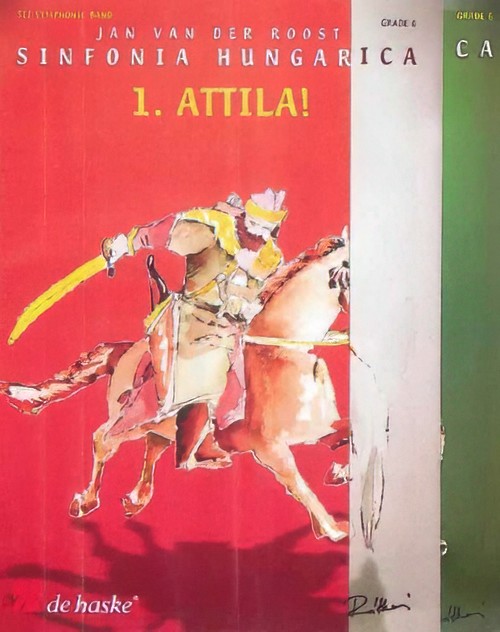 £551.99
£551.99Sinfonia Hungarica (Concert Band - Score and Parts) - Van der Roost, Jan
This three-movement symphony musically depicts the history of Hungary. Key historical figures, wars and other important events from this country inspired all three movements. The first movement depicts Atilla, the King of the Huns, and is characterised by fear, threat and aggression. The second movement focuses on Arpad, the founder of the Hungarian State and the final movement is named after Istvan, the King who introduced Christianity into Hungary. The beautiful theme of the national hymn appears throughout the symphony, however it is often partially hidden. It is used as a "thread," hardly recognizable at the beginning, becoming more and more obvious near the end and it concludes the symphony as the "final apotheosis," making the band sound like a majestic living organ.Duration: 12:45
Estimated dispatch 7-14 working days
-
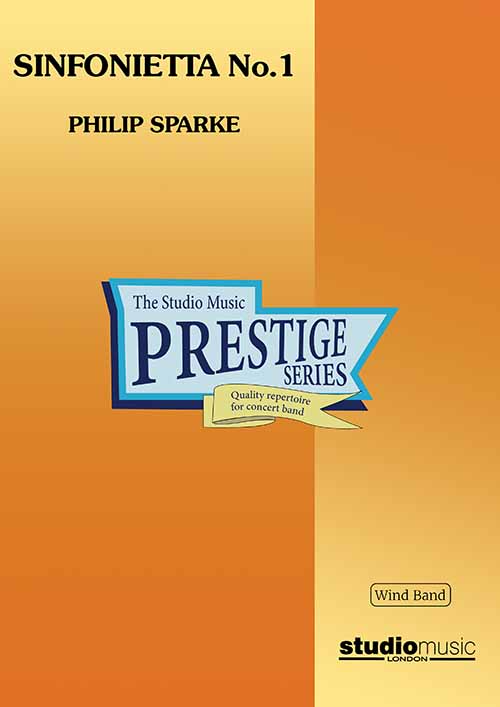 £137.95
£137.95Sinfonietta No.1 (Concert Band - Score and Parts) - Sparke, Philip
Sinfonietta No.1 was commissioned by the Foundation of Friends of the Marine Band of the Royal Netherlands Navy. It was first performed by them in 'De Doelen', Rotterdam on the 13th November 1990 (in a joint concert with the Royal Marines Band from Great Britain) which celebrated the 325th anniversary of the Netherlands Marine Corps and coincided with the 45th anniversary of the band and the 175th anniversary of naval music in the Netherlands.The work is in three, linked movements:I: OvertureSeveral contrasting motivic ideas open the work, but none manage to develop into a theme of any sort. Eventually a short theme appears on clarinet, alto saxophone and horn but it is swept away by runs of triplets from the woodwinds. The theme returns, accompanied by the triplets from the woodwinds. The theme returns, accompanied by the triplets, and this leads to a return of the opening material to close the movement.II: AriaThe second movement opens with violent outbursts from the timpani until a simple, mournful tune is presented by flute and bassoon over a sparse accompaniment by the lower brass. Trumpets introduce a quicker, turbulent central section but this leads back to a brief repeat of the original tune, bringing the movement to a peaceful close.III. ScherzoThe final movement is a fast and furious scherzo which bursts into life with a flurry of notes. The vivacious main (woodwind) theme is first played by the flutes and then by the whole woodwind section. A cornet then takes centre stage with a fanfare-like theme which is then taken up by the brass. A bridge passage then leads to a version of this theme for full band. The original flute tune is then developed until the horns introduce a chorale tune which is taken up by saxes and then full band until the opening material reappears. The woodwind and brass themes are then combined and lead to a forceful version of the chorale which becomes more and more dissonant until the opening of the Overture returns to bring the work to a rousing finish.Recorded on QPRM134D THE KINGS GO FORTH, Central Band of the Royal Air Force
Estimated dispatch 7-14 working days
-
 £27.95
£27.95Sinfonietta No.1 (Concert Band - Score only) - Sparke, Philip
Sinfonietta No.1 was commissioned by the Foundation of Friends of the Marine Band of the Royal Netherlands Navy. It was first performed by them in 'De Doelen', Rotterdam on the 13th November 1990 (in a joint concert with the Royal Marines Band from Great Britain) which celebrated the 325th anniversary of the Netherlands Marine Corps and coincided with the 45th anniversary of the band and the 175th anniversary of naval music in the Netherlands.The work is in three, linked movements:I: OvertureSeveral contrasting motivic ideas open the work, but none manage to develop into a theme of any sort. Eventually a short theme appears on clarinet, alto saxophone and horn but it is swept away by runs of triplets from the woodwinds. The theme returns, accompanied by the triplets from the woodwinds. The theme returns, accompanied by the triplets, and this leads to a return of the opening material to close the movement.II: AriaThe second movement opens with violent outbursts from the timpani until a simple, mournful tune is presented by flute and bassoon over a sparse accompaniment by the lower brass. Trumpets introduce a quicker, turbulent central section but this leads back to a brief repeat of the original tune, bringing the movement to a peaceful close.III. ScherzoThe final movement is a fast and furious scherzo which bursts into life with a flurry of notes. The vivacious main (woodwind) theme is first played by the flutes and then by the whole woodwind section. A cornet then takes centre stage with a fanfare-like theme which is then taken up by the brass. A bridge passage then leads to a version of this theme for full band. The original flute tune is then developed until the horns introduce a chorale tune which is taken up by saxes and then full band until the opening material reappears. The woodwind and brass themes are then combined and lead to a forceful version of the chorale which becomes more and more dissonant until the opening of the Overture returns to bring the work to a rousing finish.Recorded on QPRM134D THE KINGS GO FORTH, Central Band of the Royal Air Force
Estimated dispatch 7-14 working days
-
 £134.99
£134.99Hunting Tower (Concert Band - Score and Parts) - Respighi, Ottorino - Cesarini, Franco
Not much is known about the origin of Huntingtower, except for the fact that this ballad was composed in 1931 by the Italian composer Ottorino Respighi (1879-1936), commissioned by Edwin Franko Goldman and the American Bandmaster Association, and was premiered on 17 April 1932 at a concert in memory of John Philip Sousa in Washington D.C. It is not even certain whether Respighi arranged the work himself, or left this to someone else. Huntingtower is the name of a castle in Scotland, where Respighi spent some time. It is possible that this ballad contains his musical impressions of his stay there. The orchestration on this CD, made by Franco Cesarini in 1987, is an adaptation of the work to the demands of the contemporary concert band.Duration: 7:30
Estimated dispatch 7-14 working days
-
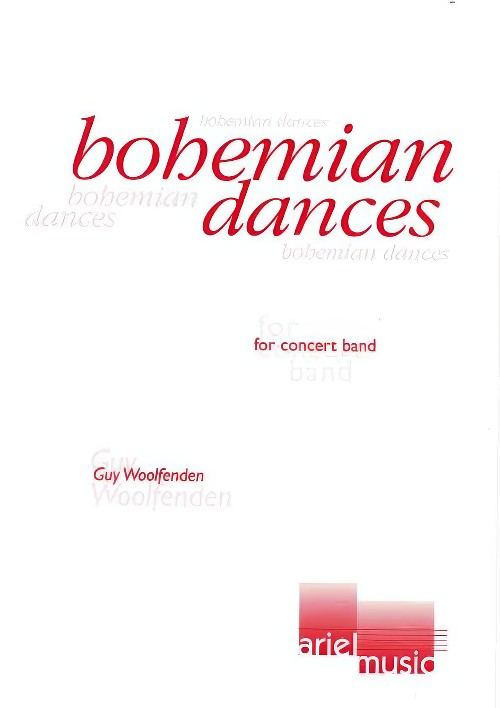 £115.00
£115.00BOHEMIAN DANCES (Concert Band) - Woolfenden, Guy
Includes:1. Shepherds and Shepherdesses2. Florizel and Perdita3. Dance of the SatyrsOne of my favourite Shakespeare plays is The Winter's Tale, and I have written music for three completely different productions during my time as Head of Music to the Royal Shakespeare Company. One, starring Judi Dench as both the mother, Hermione and her daughter, Perdita, had a big band Tribal Love-Rock score; another had a more classical, but timeless feel to it, and the last was an excellent small-scale touring production, for which I was allowed only a handful of instruments. It is from this source that the basic themes for Bohemian Dances, and an earlier version Three Dances for Clarinet Choir, have emerged. Act IV of the play is set in the kingdom of Bohemia - hence the title of the work.Shakespeare calls for "A Dance of Shepherds and Shepherdesses", which gives Florizel, the son of Polixenes, (King of Bohemia) a chance to become better acquainted with the beautiful Perdita, the lost daughter of Leontes, (King of Sicilia). This movement is written in seemingly tricky and ever-changing metres, but is rhythmically quite logical and melodically catchy.The slower second movement 'Florizel and Perdita' is the lovers' pas de deux: a gentle, slow waltz-like tune, initially presented by the principal oboe, is contrasted with a lndler-like double time melody, at the end of which a solo clarinet makes a link to the last movement.'Dance of the Satyrs' is a rip-roaring, foot-stamping dance performed in the play by 'three carters, three shepherds, three neat-herds, and three swine-herds', who enter in outrageous costumes representing the lecherous half-man, half-goat of Greek mythology. This dance is referred to as a "gallimaufry of gambols" - now where have I heard that word before?! - GW
Estimated dispatch 7-14 working days
